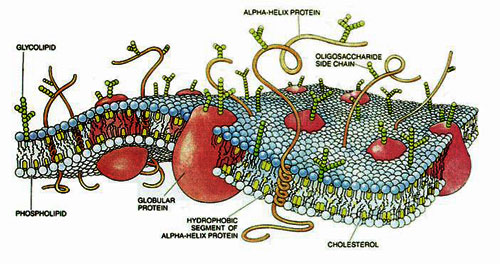Individual Cell Metabolism Important for Disease Prevention
27th March 2015
The nutritional debate is increasingly moving to the cellular level. Each cell's metabolism, i.e. the complex physical and chemical processes occurring within the cell, requires optimum nutrition and detoxification to function correctly and to keep us thriving.
"When we think of health and nutrition, few of us imagine the cell. But actually, the cell is the source of the body's energy supply; it's what keeps you not only functioning at optimal health, but functioning at all. In fact, as soon as the cells lose any of their capacity to produce energy for the body, the result is a decline in health and the emergence of degenerative conditions. Healthy cell life produces what we call 'vitality' - a healthy level of energy and resistance to stress."
- Preventive-health-guide.com (1)"

The functioning of the human cell is extremely complex, as illustrated here by a drawing of a small section of the cell membrane. Image copyright: Wikimedia Commons.
Although the mainstream medical field is picking up on the latest research findings slowly, practices such as hair mineral analysis, live blood analysis, orthomolecular medicine and various independent doctors and health practitioners are able to provide fascinating insights into the functioning of your individual cells.
Epigenetics
The exciting realization that came with epigenetic research was that nutrition can either turn on or off both sickness-causing and healthy DNA sequences inside human cells.
The fairly new scientific field of epigenetics has revolutionized the general understanding of the role that genes play in disease. Whereas before it was believed that diseases and weaknesses caused by genes were largely untreatable, epigenetics have shown that this is not the case.
'Epi' (above) + 'genetic' literally means 'above genes' or 'on top of genes' and the name is derived from the realization that certain proteins and enzymes work 'on top of' genes to control the functioning of DNA.
"Genes dictate where and how proteins transport their messages. Through proteins nutrition and other environmental factors can shut down gene signals or protect and enhance them."
- 'Luontaisterveys' magazine (2)
Epigenetic research focuses on gene signal changes which are caused by something else than changes in the actual DNA blueprint. Many epigenetic mechanisms of the human body develop in the womb and in childhood, as influenced by nutrition, environmental chemicals and, later on, by aging.
Bruce Lipton has written a great book to explain the principles of epigenetic research to non-scientists. It is called "The Biology of Belief".
DNA Methylation
One of the most studied epigenetic mechanisms that can suppress the expression of genetic disease in the human body is DNA methylation. It is a biochemical process where a methyl group (CH3) is added to the DNA nucleotides. The nucleotides serve to carry packets of energy within the cell in the form of ATP etc., playing a central role in cell metabolism. They also participate in cell signalling, etc.
The book 'Nutrient Power' by Dr. William J. Walsh, explains how undermethylation of DNA is linked with depression and low serotonin levels, whereas overmethylation of DNA is linked with anxiety, schizophrenia and excess dopamine levels. The question is therefore always about the correct balance of nutrients depending on an individual, as there is no one-size fits all approach.
Dr. Mark Hyman writes in Huffington Post (3):
"Taking just a few vitamins CAN optimize the function of ALL your body's systems. It's true. But you have to know what to take, what form of the nutrients and you have to know why these supplements work...
In this blog, I am going to discuss one of the most important biochemical processes for long-term health and how to keep it functioning optimally with supplements and other strategies. The process is called methylation because it involves moving around a chemical group called methyl, which consists of one carbon and three hydrogen molecules.
Unfortunately, many people suffer from one or more [...] factors that negatively impact this biochemical process, so problems in this area are widespread, though many don't realize they are suffering."
Dr. Hyman goes onto list the factors that affect your methylation process as follows (3):
- Genetics (homocysteine levels)
- Poor diet (greens, B12 and B6 being the most important)
- Smoking (because it inactivates vitamin B6)
- Malabsorption (poor digestion, allergies)
- Decreased stomach acid (causes reduced absorption of vitamin B12)
- Medications
- Other conditions (e.g. hypothyroidism, kidney failure, cancer, pregnancy)
- Toxic exposures (e.g. mercury can interfere with vitamin production)
He also provides a list for optimizing your own methylation process (3):
- Eating dark, leafy greens for folates (only natural folates are safe, he says)
- Getting adequate vitamin B's in your diet
- Minimizing animal proteins because they increase homocysteine levels
- Minimizing sugar and saturated fats because they deplete the body's vitamin stores
- Avoiding vitamin-depleted foods
- Avoiding caffeine because it depletes B vitamins
- Limiting alcohol and eliminating cigarettes for the same reason
- Keeping your gut bacteria healthy, so as to properly absorb vitamins from food
- Improving stomach acid with herbal bitters, etc.
- Taking supplements that prevent damage from homocysteine, e.g. folates, B12, B6, betaine
"By working to optimize your methylation you can protect yourself from virtually all the so called 'diseases of aging'. When you do, you will be well on the road to lifelong vibrant health." - Dr. Hyman (3)
However, Dr. Hyman's view may be a fair bit simplified. Some people do well on B6 supplements, some do not. Some people need to steer clear of all the methyl-donor supplements. And because everyone's body is different, a unique combination of nutrients may be needed to optimize health. In addition, some people may have a combination of over- and undermethylation problems at the same time... (4)
Homocysteine levels in the blood can apparently be used as a rough guide whether someone is an over- or undermethylator, and the specific nutrient protocols needed can be researched further from there. (4)
This sophisticated science has been developed over time to also understand whether certain key nutrients are taken into the cells or whether they are left under-utilized, in which case they can collect in the wrong places in the body and cause harm. 'Hair mineral analysis' and the related 'nutritional balancing' also measure and enable heavy metal detoxification, another key element to address on the way towards healthy cellular metabolism.
Optimizing Cellular Nutrition
Methylation is only one aspect of cellular health and research is ongoing to increase our understanding on the human cell. Meanwhile, apart from studying all the individual nutrient needs which have already mapped out, the best course of action to ensure cellular health seems to be very close to the one that has for some time been recommended by good nutritionists.
One of the first things is enzymes: Nutrition-derived (digestive) enzymes are able to increase methylation. Since undermethylation seems to be a more common problem than overmethylation, digestive enzymes from supplements or raw foods would be beneficial for many people.
Free radicals (from rancid oils for example) can damage the DNA inside the cells. Researchers Donkena, Young and Tindall explain that genome (DNA) oxidative damage has been associated with the process of free radicals stealing electrons from the lipids (fats) of the cell membranes (5). Avoiding free-radicals from foods, such as bad quality oils, therefore becomes important. Even though antioxidants have for a long time been revered for preventing oxidation, but Prof. Hiltunen explains in the Finnish, Luontainterveys (Natural Health) magazine (2) that in view of the latest research this may not be the case. He suggests that the free radical damage of cells cannot, after all, be prevented by antioxidants.
Antioxidants don't work at all through the chemical oxidation process, as previously thought, but through cell signalling, Prof. Raimo Hiltunen says. Nevertheless, they are his key recommendation for cellular health and optimal methylation, in addition to an adequate intake of essential fatty acids (EFAs). (2)
To optimize cellular health we therefore need the correct balance of nutrients, including antioxidants, vitamins, minerals, phytonutrients, carbohydrates, proteins, healthy fats, etc., together with detoxification of toxic chemicals, undigested food particles and heavy metals. Bruce Lipton's research shows that even our thoughts affect cellular health. So a holistic approach to health is once again of utmost importance.
"Disease is rarely caused by one type of gene but synthetic medicines are mostly meant for one type of gene only. [...] The medicine of the future seems to move closer to Chinese Medicine. [...] The postgenomic era renders questionable a reductivist approach [to medicine] where one [type of] gene or its protein is affected at one time by a specific medicine. A more holistic approach is more appropriate, where all the genes and their proteins are observed at the same time."
- Prof. Raimo Hiltunen (2)
The correct diet is different for different people, because of genetic diversity, Prof. Raimo Hiltunen explains. He is involved in the international ADME research (absroption, distribution, metabolism, excretion), which studies how well nutrients, such as antioxidants, are utilized by the body. "It's not enough to tell people to eat berries and vegetables", he says, "we have to find out how they are utilized by the body". (2)
Genetic information will be more and more important for medical routines in the future, Prof. Hiltunen says, and while reliable genetic mappings of individuals have been quite expensive so far, the prices will eventually come down, he reassures us. "Individual cell metabolism would be good to know as early as possible so that diseases can be prevented." (2)
Sources:
(1) Preventive-health-guide.com: "Is poor cellular nutrition the true cause of degenerative diseases?"
(2) 'Luontaisterveys' magazine, 4/2014: "Antioksidantit vaikuttavatkin geeneihin" (Antioxidants affect genes). Translated from the original article in Finnish.
(3) Mark Hyman, MD: "Nutrition Tips: Folic Acid: Killer or Cure-All?" in Huffington Post
(4) Enzymestuff.com: "Methylation"
(5) Obstetrics and Gynecology International: "Oxidative Stress and DNA Methylation in Prostate Cancer" by Krishna Vanaja Donkena, Charles Y. F. Young and Donald J. Tindall.
(6) Dr. Lawrence Wilson, MD: "Methylation", Drwilson.com
Continue reading....
Cell Membrane Permeability
Hair Mineral Analysis
Fifth Hair Mineral Analysis test results, April 2015, Critical Review
Live Blood Analysis
Edward Howell: Enzyme Nutrition - book review
We Recommend
Latest Articles
Most Popular Articles
Collection of Best Raw Food Articles
Juice Fasting Articles
Book Summaries
Natural Remedy Library A-Z

Edition 3.0: Cheap Revolutionary Health Ebook: 68 Natural Tricks and Methods - The Amazing Power of Small Everyday Tasks
To be safe, please consult your health-care provider before attempting self-treatment for health issues.
Navigation
Home Latest Articles Conditions A-Z Raw Food Juice Fasting Recipes My Health Journey Best ArticlesGet in Touch:
Contact Us Instagram: "Good Life Meals"About CHR:

Ulla is the Editor of Cheap Health Revolution, covering natural remedies and health solutions. Read more about Ulla and this website here: "About CHR"









